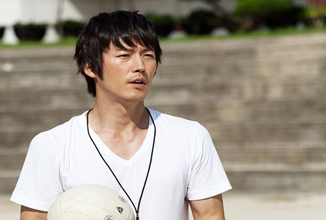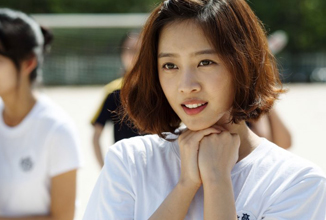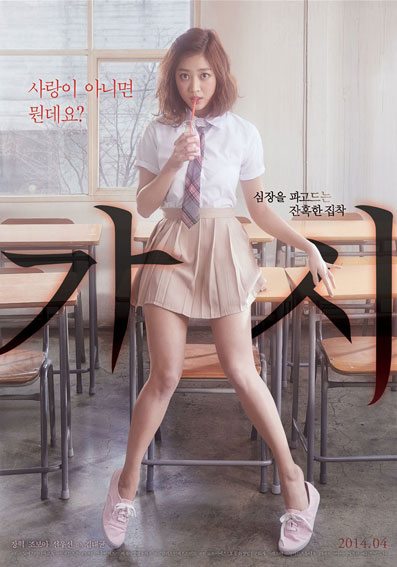"I was just a toy to you? A plaything you dabbled with till you got bored? Pleased to get it on the cheap?
Your heart is pounding... exactly like it did that night. Remember? That means it's love, I know it!"
Synopsis:
Physical injury having forced him to give up his dream of playing rugby, Joon-gi (Jang Hyeok) has taken a job working as a physical education teacher at an all girl school in order to support his heavily pregnant wife. While easily able to field and dismiss being the object of numerous hormonal schoolgirl crushes in the course of his teaching activities, one student's blatantly overt displays of affection are increasingly difficult for Joon-gi to shake and despite his best intentions thoughts of this effervescent, carefree young woman, Yeong-eun (Jo Bo-ah), soon begin seeping into almost his every waking moment.
When a sexually-charged encounter with the young femme fatale on a rain soaked evening places him in a deeply compromising position, Joon-gi decides he must distance himself from Yeong-eun once and for all; only to find her repeatedly turning up at his home under the pretence of being tutored by his wife.
However, unsettled though this makes him feel it pails into insignificance when compared to the full extent of the young girl's plans. For, not only is she intent on making Joon-gi her very own but she's also determined to take his wife's place at his side and is fully prepared for whatever steps she deems necessary to make her 'love' a reality; regardless of how violent, or even murderous, her actions may need to be...
Review:
While depictions of women in Korean cinema have unquestionably greatly evolved over the years - largely in tandem with the changing place of females and indeed femininity within Korean society itself and the gradual, often difficult shift from historically patriarchal ideals of Korean traditionalism to a (certainly somewhat) more equality based, modern and (dare I say) increasingly Westernised male/female footing - regardless of how far back into Korean film history you care to look you'll find repeated dissections of the supposedly dire consequences (to men, women themselves, the family unit and indeed the very fabric of society) of female self-awareness; women's pursuit of personal desires at the expense of familial responsibilities; and the indulgence in baser sexual instincts in flagrant disregard of the moral high ground given to pre-marital chastity; the acceptance of familial responsibility; and love and happiness being achievable only through wedded bliss.
Whether you choose to step back as far as 1936's 'Sweet Dream' (the second oldest surviving Korean film) to a depiction of a female forsaking her family and responsibilities for self-serving pleasure in the embrace of modernity; traverse the Golden Age through classics such as Kim Ki-young's 'The Housemaid' (1960) and 'Insect Woman' (1972) to see hapless men seduced and families destroyed by devious and wanton femme fatales (and in the case of 'Insect Woman' males checking themselves into mental institutions suffering from adultery induced schizophrenia, again caused by women); look at far more recent films for the norms of society's abhorrence of alternative lifestyles ('Yellow Hair', 1990) and cross-generation relationships (1991's 'Lies'; 2005's 'Green Chair' etc); or pick from an utter plethora of movies from all points in between and/or since, the above themes have been so long held and regularly referenced that they have continued to appear as cinematic subtext to a society that itself has increasingly stepped away from traditionalism. In recent years, there has been a noticeable increase in films featuring strong, self aware, self reliant and independent women but whether those tales are of love, sex, adultery or betrayal the above themes could be said to play their part in the subconscious background from which many emerge.
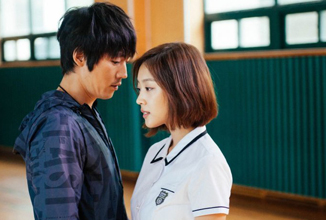 |
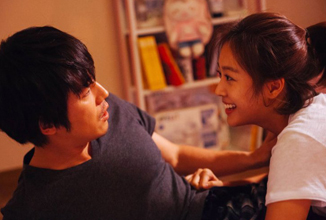 |
On a cursive look, 'Innocent Thing' does appear to be (and is, to some extent) a fairly generic narrative detailing a young girl's infatuation for an older man turning to twisted obsession - appearing in cinema from numerous countries and periods - but director Kim Tae-gyoon also underlines the entire structure with several of the aforementioned themes and ideas both in an attempt to imply a lineage of sorts and in an effort to add somewhat of an extra layer to a so often seen cautionary tale; though ultimately some areas are more successfully realised than others.
The very first scene in 'Innocent Thing' in just a couple of minutes deftly sets out not only Yeong-eun's infatuation for Joon-gi but also her utter determination to both be noticed by and to get close/closer to him:
As Joon-gi teaches a swimming lesson to his class of giggly, rowdy (and, if you will, immature) girls, Yeong-eun ascends the steps to the top diving board, her face totally serious (in stark contrast to her classmates) and her mind utterly focused on what she is about to undertake. Hesitating only to ensure that Joon-gi is paying attention, she plummets into the water; remaining beneath the surface, calmly holding her breath and gazing upward knowing that the object of her affection will have no choice but to jump in and 'save' her. This he, of course, does and on bringing her back to the surface (holding her throughout) the sheer joy she clearly feels is too much for her to contain: As he asks her if she's ok, Yeong-eun says nothing but beams with a smile of pure contentment and success.
Her subsequent and continual overt displays of affection (placing a heart shaped sticker on his back on which is written "Joon-gi belongs to Yeong-eun"; her assertion that she wants to learn about rugby in the hope he'll take her with him when he plays; her bold question of "Do you like me" as she sits soaked and shivering after being caught in the rain; etc) all blatantly scream of her unshakeable resolve to be at the forefront of his mind, and we, at the same time as Yeong-eun herself, soon come to realise just how successful her efforts have been.
Peppered within these incidences, 'Innocent Thing' also details the increasing difficulty that Joon-gi has in dispelling thoughts of Yeong-eun from his thoughts; shown in none too subtle a manner - we see Joon-gi watching Yeong-eun from afar as she has a water fight with her friends (complete with musically accompanied slow motion visuals of her 'playing' and turning her head to swish her water-soaked hair, rather like a kind of soft focus shampoo commercial) and see him watching rugby on TV only to have her dancing image take over the television image - but though these too serve their purpose they are rather noticeably contrived, to say the very least.
Thankfully, as the narrative moves closer to the main 'Will they or won't they?' scene things settle to a far more realistic and believable level and it does have to be said that lead-up to the aforementioned compromising situation is both deeply evocative and highly sexually charged.
The references to Joon-gi's home life (i.e. the family unit soon to be close to being torn asunder; as seen in so many of the films referenced earlier in this review) is sadly handled less than adeptly and though it seems clear that its inclusion was intended as a vital piece of the overall puzzle, for whatever reason it is almost so passing as to be hardly worthy of note. If we are to believe that the constraints of familial responsibility; Joon-gi's forsaking of his dreams to provide for his wife and baby to be; and his father-in-law's 'help' in getting him his teaching job, are almost enough to drive him into the arms of a carefree young woman, then to my mind slightly more is needed than seeing Joon-gi holding a cigarette with chopsticks so his wife won't know he's smoking; being told he shouldn't play rugby because he previously broke his leg; and a dinner table conversation with his larger family during which he has nothing to say. Ok, I admit this is clearly meant as an addition rather than a narrative thread in its own right but in spite of that fact, as far as I'm concerned, it should either appear in earnest or not at all.
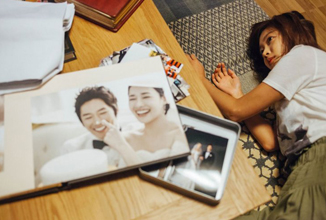 |
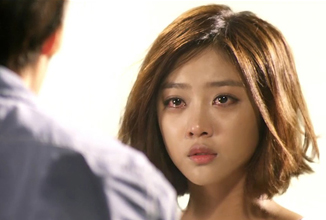 |
It will likely come as no surprise that the second half of 'Innocent Thing' focuses on Yeong-eun's violent retribution against those who have stood in her way; continue to thwart her plans for a 'happy ever after'; or have (at least from her increasingly unbalanced perspective) taken by force the one thing sure to keep Joon-gi by her side, and this depiction too is very much a double edged sword:
On the one hand, the gradual disintegration of Yeong-eun's mind (as Joon-gi inevitably slips through her fingers) is handled well overall as is the violence she unleashes - particularly effective are the palpably tense scenes in which she has quietly vitriolic conversations with individuals while gently extending and retracting the blade of a pink X-Acto knife - and the decision to have her exact vengeance on those around Joon-gi (never intenting to hurt the man she adores and always will) while constantly reiterating her unshakeable belief that her relationship was (and is) true love gives a nice step away from the normal 'girl falls in love; is spurned; turning love to hate' scenario that is far more common. However, on the other, the fact that the surprise elements of the narrative are largely dependent on viewers not being sure of the full state of play - have Joon-gi and Yeong-eun slept together; is Yeong-eun pregnant; etc. - results in key information deliberately withheld and while this would (almost) have been understandable in a different instance, the inclusion of more than one scene appearing out of nowhere and not quite fitting - for example, Joon-gi and Yeong-eun shown spending a laughter filled day at a fairground (for any and all to see) straight after Joon-gi has told her their relationship can never be and she must never make mention of their 'evening' together - made me, for one, constantly wonder if the aforementioned information was indeed being deliberately held back or if its depiction had simply been inadequately realised. In fact, the only way this wouldn't be rather an issue would be on a second viewing when viewers already know the missing story elements but that in itself would negate the very surprise for which the information was withheld in the first place.
As a side note, the decision to portray Joon-gi's wife as ultimately far from blameless is a far more intelligent move; using her deeply dubious actions to underline the importance that maintaining and protecting a stable family unit has to women who follow traditional values, at the same time as raising the issue of 'who is innocent, who is not' for the first time - a question that will be further referenced much later in proceedings, to great effect.
The conclusion of 'Innocent Thing' will be fairly familiar to fans of Korean cinema and works well as such; adding a melodramatic element to proceedings that has become almost requisite in Korean drama over the years.
However, the combination of this and a small coda sequence to my mind adds up to possibly the strongest moment (and sentiment) of the entire film: Throughout the narrative, Yeong-eun has been repeatedly reiterating the same phrase (initially. in the present tense; later, in the past) and in the final scene drawing to a close we are brought face to face with the possibility that she may not have been as deluded as she appeared, after all.
As a result, when the credits roll and Yeong-eun is shown (in music accompanied flashback) dancing happy and carefree in the school yard, we are left to wonder if perhaps... just perhaps... she really was the 'Innocent Thing' referred to in the film's title.
Cast:
Jang Hyeok, Jo Bo-ah, Seon Woo-seon, Lee Do-ah
Directed by:
Kim Tae-gyoon
Summary:
While ever so slightly affected by a deliberate and noticeable, albeit temporary, withholding of information on more than one occasion, 'Innocent Thing' still manages to stand as an engaging drama/thriller; a story of love, obsession and revenge the conclusion of which greatly strengthens the entire preceding narrative.
Innocent Thing (가시) / 2014 / Directed by Kim Tae-gyoon
|


